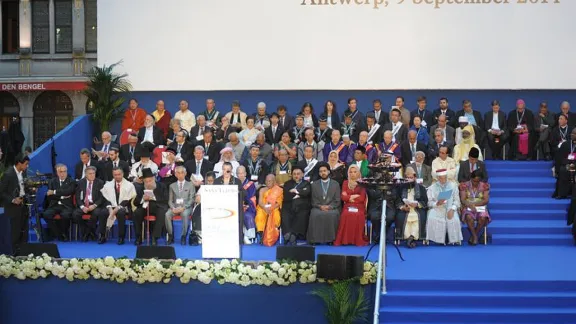
The final ceremony of the 2014 Sant' Egidio
(LWI) - Structural injustice in the economy is fuelling growing discord worldwide, was a key message from the General Secretary of The Lutheran World Federation (LWF) Rev. Martin Junge at an international gathering of religious leaders.
Speaking during two panel discussions at the 28th edition of the international meeting “People and Religions” hosted by the Community of Sant’Egidio, at Antwerp, Belgium, 7-9 September, Junge urged church leaders to see their ecumenical efforts as a response to God’s call for justice and peace.
The theme of the meeting was “Peace Is the Future: Religions and Cultures in Dialogue 100 years after World War I”. Participants reflected on the futility of war and dedicated themselves to finding lasting peace.
During a discussion on “Economy in the Service of Peace,” Junge, a Chilean theologian, noted that people, communities and regions are excluded from fair access to the world’s resources and wealth.
“Disparities are growing, gaps are widening, even among societies with a traditionally strong socio-economic cohesion. Injustice in the way the wealth is distributed is mounting,” the LWF general secretary emphasized.
“If there isn’t room in minds and hearts for a different, thereby inclusive, respectful, sustainable and solidarian individual and collective life project, obviously there won’t be any room for engaging in required change,” he said.
“With no change, though, the economy will increasingly become a source of conflict, rather than a contribution to peace,” Junge concluded.
The general secretary also participated in a panel discussion on “Unity of the Church and Peace”, where he questioned whether churches have become too used to their fragmentation.
Reflecting on LWF’s reconciliation with Mennonites, he added that the quest for unity among churches is part of their call by God to a wider mission of “compassion, reconciliation, justice and peace for the whole world.”
Junge said eucharistic hospitality offers the ecumenical movement a way to model God’s inclusivity. “In a world characterized by so many fragmentations, how long can we afford adding even one more, more so if it is about the table that doesn’t belong to any of us, but to which we are all invited?”
The conference was attended by a number of European leaders and cultural leaders and religious authorities from all over the world including the President of the European Council; the founder of the Community of Sant’Egidio, Prof. Andrea Riccardi; the Syriac Orthodox Patriarch Ignatius Aphrem II; the Patriarch of Babylonian Chaldians Louis Raphael I Sako; and the Grand Mufti of Egypt Shawki Ibrahim Abdel-Karim Allam. It concluded with faith groups holding separate prayer sessions then joining in an inter-religious procession and together making a proclamation for peace.


